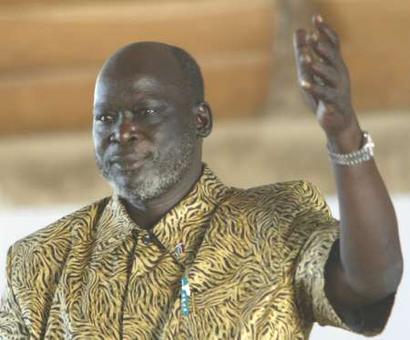Bulls slaughtered as Sudan rebel leader hails peace

By Wangui Kanina
YEI, Sudan, June 8 (Reuters) – Three bulls were slaughtered in the dusty town of Yei in southern Sudan on Tuesday as main rebel leader John Garang brought news of impending peace to a country torn apart by 21 years of civil war.
Garang smiled and waved to surging crowds of thousands of people who ululated and cheered his arrival. His convoy of four-wheel-drive vehicles entered Yei along dirt roads littered with rusting shells of tanks and trucks, leftovers from the war Garang is credited with helping end.
The bulls were slaughtered at three symbolic points where the rebels lost key positions and suffered many casualties.
“The peace is not about the papers we signed in Nairobi, it is about what the widows and the orphans think it brings to them,” he told the crowds, some climbing trees to see better.
“(I am) bringing the news that we are at the threshold of peace,” he told reporters.
The Khartoum government and Garang’s Sudan People’s Liberation Army/Movement (SPLA/M) signed a string of peace accords in May aimed at ending Africa’s longest civil war.
Often depicted as a conflict between the Arab, Muslim north and black animist or Christian south, the war which has killed two million people has been fuelled by divisions over control of oilfields and political power, and religious issues.
Mediators expect the two sides to nail down the remaining issues — ceasefire arrangements and how to implement a final deal — within two months of resuming talks on June 22.
In Yei, a low-built town in lush, flat farmland, Garang launched a workshop on good governance at a women’s centre.
“If a woman now goes for five miles to collect water, and we can reduce that distance to zero, then we have liberated her,” he said, adding that the peace process would not lead to an elitist leadership that had little touch with common people.
Garang said his mission was to tell the people that only two issues — the ceasefire agreement and the means of its implementation were outstanding at the peace talks.
“I will explain to them how they can take advantage of this agreement, because if people do not think the peace is good for them, no-one can shove it down their throat,” he said.
The Khartoum and SPLA accords do not cover a separate civil war raging in Sudan’s western region of Darfur.
Garang, a former Sudanese army colonel whose rebel movement has fought for greater autonomy in the south since 1983, described the strife in Darfur as “a sad situation”.
The United Nations says fighting in Darfur has displaced one million people, and officials have said the conflict has caused one of the world’s worst humanitarian crises.
“The SPLM will not be a part of the war in Darfur, we have told the government this war cannot be won militarily and that we are willing to do whatever we can to help,” Garang said.
“Darfur is important to us not because of aid money or donors, but because we don’t want people in our country to die.”
